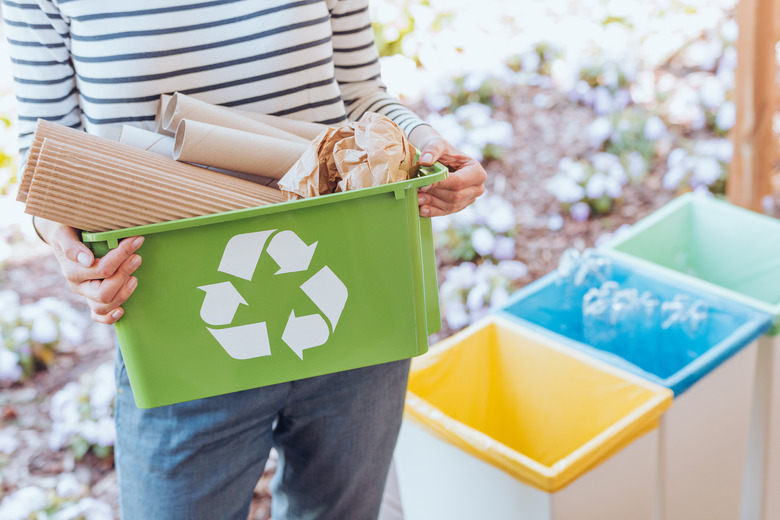List Of Materials That Are Recyclable
Recycling can seem like a daunting, complex chore. Every city and state run their recycling centers differently, so it's important to check with your hometown's local website to learn more about recycling in your area. So, what's recyclable?
Paper
Paper
Newspapers, office paper, magazines and cardboard without corrugation (think cereal boxes) are all mixed paper recyclable materials. You can even recycle gift wrapping paper if it doesn't have a plastic film coating on the top. Paper recycling may be one of the easiest and most common forms of recycling.
Metal
Metal
There are two major categories of metal recycling: aluminum and steel. For aluminum, think soda cans. Steel cans often store soups, sauces, beans or fruit. The lids of these cans are also recyclable. If you aren't sure how to tell them apart, remember this: Steel cans are magnetic, aluminum cans are not.
Glass
Glass
Many glass products in the U.S. today contain more than 27% recycled glass. Glass bottles and jars are recyclable materials, but not the lids. Check with your local recycling facility to see if your glass needs to be separated from other recyclables or if it needs to be separated by color. Don't recycle ceramics, heat-resistance glass (like Pyrex), or mirror glass.
Plastic
Plastic
Plastics are often the most confusing type of recyclable material. What do those numbers on the bottom of the container mean, anyway? Let's break it down.
The important take-away is that not all plastics are recyclable materials. The symbols on the bottom of plastic containers tell us what type of plastic resin makes up the container. The most commonly seen and recyclable plastics are #1 (PET: clear plastics, like water and soda bottles), #2 (HDPE: usually more opaque plastics, like laundry soap and milk jugs), and #5 (yogurt, butter, sour cream containers).
Even so, there are recycling restrictions within those numbers. Plastic clamshells (that berries or spinach can be packaged in) are labeled #1 but are not recyclable. Because of the way this plastic is created, it's not able to be melted down to its basic plastic building blocks again.
Batteries
Batteries
Batteries contain toxins like silver, zinc or even mercury. It's important to recycle batteries to prevent them from leaking into the ground in landfills. Check out Waste Management's guide, "What Can I Recycle?", to learn how you can recycle batteries. Consider switching to rechargeable batteries if you use more than a dozen disposables a year. It would save money, too!
Car batteries are composed of lead (60%), plastic (around 3 pounds) and sulfuric acid. All of these components can be recycled and used in new batteries. Contact your local municipality to learn the best way to recycle car batteries in your area.
Electronics
Electronics
More than 130,000 computers are thrown away in the U.S. every day. Yet almost all parts of a computer are able to be recycled: plastic, metal and glass.
Cell phones make up 65,000 tons of electronic landfill waste every year. Phones have valuable metals, copper and plastic, and by recycling phones, manufacturers can recover these resources from discarded phones instead of from our planet.
Contact your local municipality to learn more about recycling electronics where you live, or head to Waste Management's informative website to learn more.
What to Do with Your Recyclable Materials
What to Do with Your Recyclable Materials
Rinse out your plastic, metal and glass recycling materials before placing them in your recycling bin. Paper materials should be clean and dry. If your pizza box has cheese or grease stuck to the box, it's garbage (pro-tip: If the top of the box is clean, rip the box in half and recycle the part that's clean!).
Remember, avoid recycling items that aren't truly recyclable. When non-recyclables are put into recycling, it has to be sorted out by hand, or the entire batch of recycling is now contaminated and ends up in the landfill.
Lead your families, friends and communities in new recycling initiatives. Every item counts!
Cite This Article
MLA
Taylor, Lindsey. "List Of Materials That Are Recyclable" sciencing.com, https://www.sciencing.com/list-materials-recyclable-8073576/. 22 November 2019.
APA
Taylor, Lindsey. (2019, November 22). List Of Materials That Are Recyclable. sciencing.com. Retrieved from https://www.sciencing.com/list-materials-recyclable-8073576/
Chicago
Taylor, Lindsey. List Of Materials That Are Recyclable last modified March 24, 2022. https://www.sciencing.com/list-materials-recyclable-8073576/
